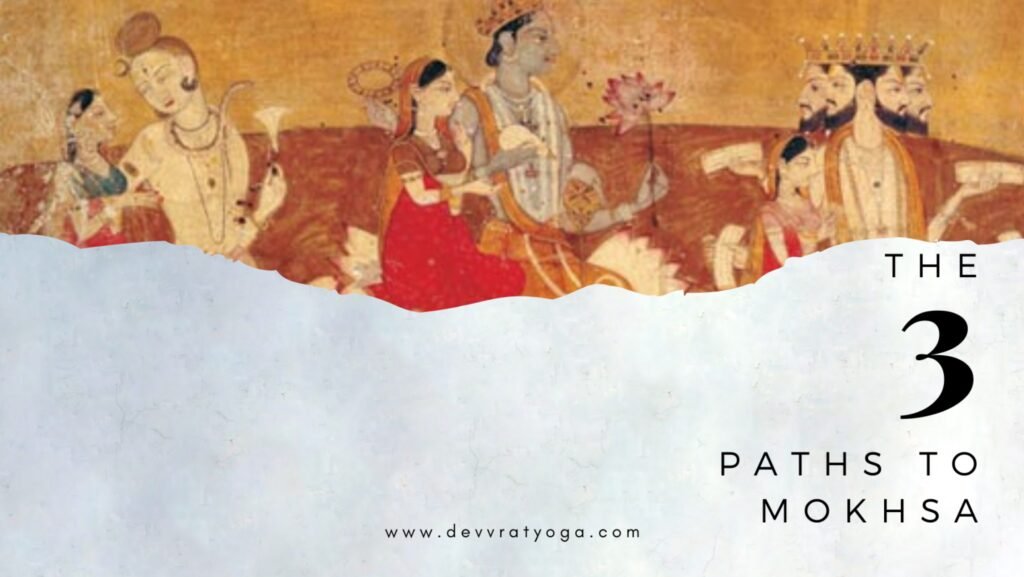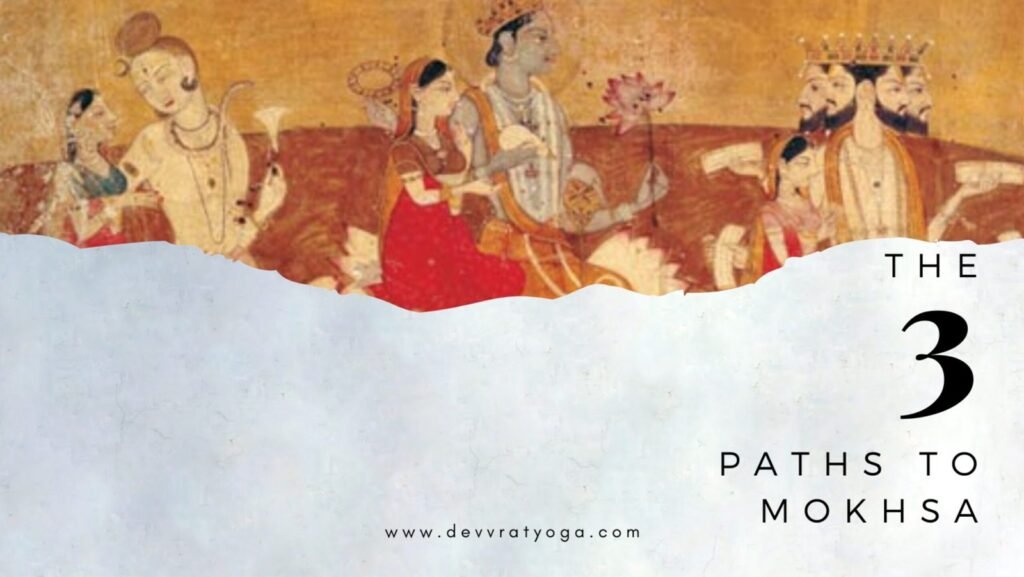The 3 Paths to Moksha: Liberation Through Knowledge, Devotion, and Action
Moksha is a profound concept in Hinduism and is also recognized in other Indian traditions such as Buddhism, Jainism and Sikhism. It refers to liberation from samsara, the cyclical process of birth, death and rebirth. At the heart of this understanding lies the law of karma, which teaches that every action has a consequence.

three traditional paths to moksha in yoga – Jnana (knowledge), Bhakti (devotion), and Karma (action) – symbolizing spiritual liberation in Hindu philosophy
According to the philosophy of karma, our actions bind us to the cycle of samsara. A person who accumulates negative karma may be reborn into a life filled with suffering or hardship. In contrast, those who cultivate positive karma are believed to return in more fortunate conditions, whether spiritually or materially. Yet, even the most privileged life remains part of samsara, a realm marked by impermanence. The ultimate aim of spiritual practice is to attain moksha, or complete freedom from this cycle.
What Is Moksha?
Moksha is not simply an escape from pain. It is an awakened state of being, where the soul is freed from illusion and united with the ultimate reality, known in yogic philosophy as Brahman. Moksha is often described as the highest goal of life, representing both release and realization.
Various schools of thought have interpreted moksha in slightly different ways. For some, it is total detachment from material existence. For others, it is a state of deep inner transformation where truth becomes visible through the fog of ignorance. Ultimately, moksha is about knowing the Self and living in alignment with that truth.
At Devvrat Yoga Sangha, students explore these teachings deeply in the 200 hour yoga teacher training in Kerala, where traditional yogic philosophy is woven into daily practice and reflection.
There are three traditional margas or paths to moksha, each offering a unique approach to liberation:
- Jnana Marga (Path of Knowledge)
- Bhakti Marga (Path of Devotion)
- Karma Marga (Path of Action)
1. Jnana Marga: The Path of Knowledge
Jnana means “knowledge” and Jnana Marga is the spiritual path to liberation through study and inner inquiry. This is the journey of the seeker who looks within, contemplating the nature of the Self and the universe. Jnana refers to a type of knowledge that goes beyond intellectual understanding. It is direct and experiential, inseparable from the truth it reveals.
This path demands ethical discipline, concentration and the study of sacred scriptures. Through techniques of meditation and reflection, the practitioner begins to see past illusion and realize their oneness with Brahman. Jnana Marga is closely associated with Jnana Yoga, and the two are often considered the same. It leads to self-realization and ultimate freedom.
For those seeking structured guidance on these concepts, the yoga study material provided by Devvrat Yoga Sangha is a valuable resource, offering timeless insights into yogic philosophy and its relevance to modern life.
2. Bhakti Marga: The Path of Devotion
Bhakti Marga is the path of love and devotion directed toward a personal deity or divine presence. It is an emotional and heartfelt surrender, a way of merging with the Divine through acts of love, prayer and service. Bhakti Yoga sees liberation not as something earned, but as a gift received through the grace of complete devotion.
Practitioners offer their thoughts, emotions and actions to their chosen deity, whether it be Krishna, Shiva, the Divine Mother or another form. This path is often expressed through rituals, chanting and a deep connection with spiritual teachers or gurus. It brings about an intimate relationship between the seeker and the Divine, cultivating compassion and humility.
Bhakti Marga is considered one of the most accessible paths, particularly for those with a devotional nature and a desire for emotional connection with the sacred.
3. Karma Marga: The Path of Action
Karma refers to the universal principle that every action produces an effect. Karma Marga is the spiritual path based on performing actions with full awareness and without attachment to outcomes. In this path, liberation is achieved by living with intention and integrity, not through withdrawal from the world but by engaging in it selflessly.
This is the essence of Karma Yoga. It is not simply about doing good deeds, but about offering every action—no matter how ordinary—as an act of devotion. Whether caring for family, working a job or helping a neighbor, each moment becomes an opportunity to grow spiritually.
Karma Marga aligns beautifully with the teachings of loving-kindness found in Buddhism and emphasizes the transformation that arises from serving others without seeking reward.
Following Your Own Path to Liberation
While each of the three paths offers a distinct approach, they are not exclusive. Many practitioners combine elements of all three, blending the clarity of knowledge, the warmth of devotion and the integrity of action. The goal remains the same: to transcend the illusion of separation and awaken to the truth that has always lived within us.
Whether you begin your journey through study, devotion or service, the essence of moksha is already present within you. At Devvrat Yoga, these timeless teachings are explored with care, depth and reverence, guiding you toward a path that is both ancient and profoundly personal.

